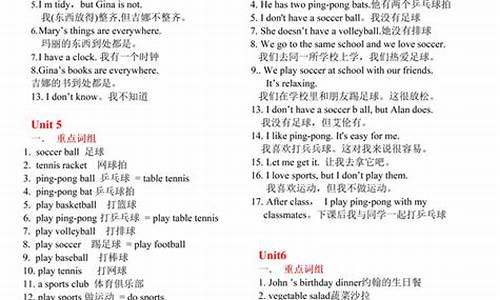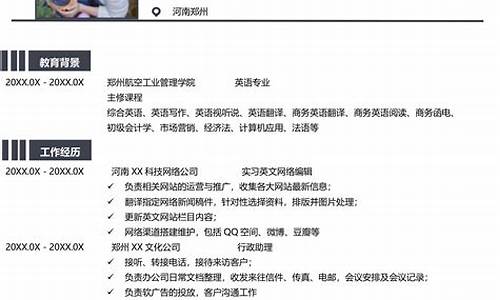您现在的位置是: 首页 > 学习作文 学习作文
初一英语下册重点归纳_初一英语下册重点归纳笔记
zmhk 2024-06-01 人已围观
简介初一英语下册重点归纳_初一英语下册重点归纳笔记 初一英语下册重点归纳的今日更新是一个不断变化的过程,它涉及到许多方面。今天,我将与大家分享关于初一英语下册重点归纳的最新动态,希望我的介绍能为有需要的朋友提供一些帮助。1.初一下学期第
初一英语下册重点归纳的今日更新是一个不断变化的过程,它涉及到许多方面。今天,我将与大家分享关于初一英语下册重点归纳的最新动态,希望我的介绍能为有需要的朋友提供一些帮助。
1.初一下学期第八单元英语知识点归纳?
2.初一下册的英语有哪些主要的重点语法?
3.初一英语下册常考知识点总结
4.人教版七年级下册英语单词整理归纳

初一下学期第八单元英语知识点归纳?
初中的英语跟小学的英语不同,所以同学们学习初一英语要打起十二分的精神学习,做好知识点总结归纳。以下是我分享给大家的初一下学期第八单元英语知识点,希望可以帮到你!
初一下学期第八单元英语知识点
get,receive, a letter from…收到…的来信;accept着重指以愉悦的态度或经过自己的争取而得到或取得某物。
情态动词should:1***表示义务,意为“应该,应当,最好”,比must较为委婉;2***与疑问词连用,表示意外,纳闷,惊讶等,意为“究竟是…;到底…”.
表示建议:1***How/What about+名词/代词/动词-ing形式?2***Why don’t you+动词原形?=Why not+动词原形?3***Let’s…以let’s开头的祈使句,表示建议对方和自己一起做某事。Let’s后接动词原形。4***Shall we…?以Shall we…?开头的疑问句,用于建议对方和自己一起做某事。回答时如赞成,常用Yes,let’s.
too…to……而不能…,to后面接动词原形具有否定含义。这一句型常可以转换成so…that…句型。当这种too…to…句型转换成so…that句型时,为保持句意的一致,that引导的结果状语从句要根据时态用情态动词can’t或couldn’t加动词原形,that从句中的谓语动词要带宾语。
The boy is too young to go to school.=The boy is so young that he can’t go to school.
The box is too big for me to carry.=The box is so big that I can’t carry it.
注意当动词不定式和主语在逻辑上构成动宾关系时,该动词后面不能再用it或them作宾语,该动词如果是不及物动词,则必须在其后面加上相当的介词或副词,方可与主语构成搭配。如,The ice is too thin for me to skate on.
instead,instead of为介词短语,后面一般接名词,代词,介词和接动词-ing形式。
for example,such example例如,诸如。多作插入语,当它表示“例如“时,其后面必须有逗号;such as相当于like,意思为“象…那样,例如,诸如”,其后面直接加名词。
contest,pete,contend三者都有“竞争”的含义,均为动词:contest指在竞争中毫无保留地展示自己;pete指在体育或辩论等需要竞争的活动中,为征服或取胜而进行的努力。有时暗指在奖赏的鼓励或 *** 下进行竞争;contend暗示竞争的紧张程度。通常指双方成功的机会相等,所以为取胜或征服对方就需要艰苦的努力。强调奋斗或斗争的必要性。
contest,
By的用法:by后跟表示交通工具的名词,意思为“乘,坐”;by意思为“凭借,用,靠”,表示方法或手段,常与v.-ing连用;by意思为“在…旁边”,用来表示地点,意义和用法近似于beside;by意思为“按照…,根据…”;by意思为“经过”,后常跟go,run,walk之类的动词;by用于被动语态中,后跟的名词表示行为的执行者,意思为“被,由”;by意思为“按…***计算***”,用来表示计量;by oneself独自;by the way顺便
as well的同义词为too,意思是“也”;as well as意思为“同,和,也”。用来连线名词和代词等。谓语动词用单数还是复数形式,要根据as well as前的名词或代词确定。与动词连用时,用v-ing形式;as well as同义词组为not only…but also…但侧重顺序不同。
初一英语学习建议
一、课前预习
预习的过程是个人独立阅读和思考的过程,它能促使同学们自己查阅有关资料、查阅字典,从而减少盲目性,提高听课质量。
二、争取课内外各种机会多练习英语
1、学会听别人说
2、大胆和别人交谈。学习英语必须在“听”中提高自己,在“说”中检测自己。把听到的,找机会向你的同学、朋友、老师“卖弄”一下;当你体会到成功的喜悦时,那些曾让你感到枯燥的句型、课文,就会一下子变得亲切而有意义了。
“听说”要注意以下两点:
***1***磁带要选对,要选难度适合自己的。听的时间要有保证:每天听半小时。应该说,听纯正、地道的语音、语调,就是一种享受。
***2***听要一句一句地听,说也要一句一句地说。不要求快。要反复听,反复说,直到听懂每一个词,说好每一句才行。练习可以起到一石三鸟的效果:既巩固了语言知识,提高了听力水平,又实现了口语运用。
三、专心听课
用心识记上课时应做到:眼到、口到、手到、心到。努力在课内有目标有意识地去识记该课的生词、短语、句型、重点句子。强迫自己在课内记住这节课最重要的内容,这样,使自己真正体会到“这节课学到不少东西”的踏实感、成就感,进而激发动机,提高兴趣,更有信心去迎接今后的学习。
四、勤记笔记
课堂上做笔记可以帮助集中注意力,理顺思路,增进记忆,锻炼分析归纳、综合概括以及快速反应的能力。笔记也为日后复习提供记忆纲要。
五、及时、经常、科学地复习
复习是学习之母。要解决困扰学习者最大的知识遗忘问题,只有靠科学的复习。从时间安排上讲,复习既要及时又要经常,不仅在当天,而且在第二天、一周后、一个月后、在你需要用它之前、在考试前都要安排复习。温故而知新,从而更牢固地掌握知识。
初一的英语学习难点
第一、音标的掌握。音标的学习比较抽象,但是确实英语学习的重中之重。音标掌握可以提高学生的自学单词能力,而单词的学习又是学好英语的奠基石。学习方法:辨别好其发音规律,正确识记书写形式,带入单词加以练习。
第二、时态和语态的运用。初中英语学习八大时态,但是重点考察五大时态---一般将来时、一般现在时、一般过去时、现在进行时、现在完成时。语态分为主动语态与被动语态,难点在于被动语态的学习。中考主要考察一般现在时、一般将来时、一般过去时和含有情态动词的被动语态。学习方法:理解概念,牢记公式,熟记标志,准确运用。
第三、阅读能力的提高。中考总分120分,听力口语30分,笔答90分,其中阅读占30分。所以初中的英语学习要极为重视阅读能力的培养。学习方法:扩大单词量,文中抓线索,统观上下文,理解要全面。
1.人教版八年级下册英语知识点总结
2.八年级英语下册知识点笔记
3.初二上册英语知识点的重点总结
4.七下英语外研版知识点
5.八年级英语下册知识点总结
初一下册的英语有哪些主要的重点语法?
对于英语这门科目,很多刚上初一的学生都感觉很迷茫,不清楚应该要学习哪些知识。下面是我为大家整理的关于初一下册英语知识点 总结 归纳,希望对您有所帮助。欢迎大家阅读参考学习!初一下册英语知识点总结
可数名词变复数
可数名词变复数时,有规则变化和不规则变化两种。
1、规则变化:
1)一般情况直接在词尾加“-s ”,如:cake-cakes, bag-bags, day-days, face-faces, orange-oranges等;
2)以s, x, sh, ch结尾的词,要在词尾加“-es ”,如:bus-buses, watch-watches, box-boxes等;
3)以辅音字母加y结尾的词,变y为i再加“-es ”,如:baby-babies, country-countries, family-families等;
4)部分以f (e)结尾的词,变f (e)为“ves ”,如:knife-knives, half-halves等;
5)以o结尾的词,加“-s ”或“-es ”,如:zoo-zoos, photo-photos, tomato-tomatoes, potato-potatoes等。记忆口诀:除了“英雄”hero外,凡是能吃的,加“-es ”,不能吃的加“-s ”。
2、不规则变化:
1)改变单数名词中的元音字母:man-men, woman-women, foot-feet, tooth-teeth等;
2)单、复同形:sheep-sheep, Chinese-Chinese, Japanese-Japanese等;
3)其他形式:mouse-mice, child-children等。
初一下册英语知识重点
介词用法:
1)具体时间前介词用at。
He gets up at half past seven every day. 他每天七点半起床。
She goes to bed at eleven o?clock. 她十一点睡觉。
2)表示“在早上,在下午,在晚上”的 短语 中用介词in,且定冠词the不能省略;表示“在中午,在夜里”的短语中介词用at,不加冠词。
in the morning在早上,in the afternoon 在下午,in the evening 在晚上 at noon在中午,at night在夜里
3) 表示“在某天”、“在某天的上午、下午等”的短语用介词on。
What do you usually do on Monday morning? 星期一上午你通常做什么? Do you sometimes go out to eat on Friday evening? 有时你星期五晚上出去吃饭吗?
He watches DVDs on Saturday night. 星期六晚上他看DVD。
Parents take children to parks on June 1. 六月一日,家长们带着孩子去公园。
4)在this, last, next, every等词前面既不加介词,也不用冠词。
What are you doing this afternoon? 今天下午你做什么?
He visits his grandma every Friday. 他每个星期五都去看望祖母。 She is going to Shanghai next Monday. 她下个星期一去上海。
初一英语知识
(一)need和dare的用法
need和dare既可用作情态动词,也可用作实义动词。用作情态动词时,主要用于否定句和疑问句。用作实义动词时,可用于各种句式。
1.用作情态动词--Need I come? --Yes, you must. --我需要来吗? --需要。 You needn't telephone him now. 你现在不必打电话给他。
I don't think you need worry. 我想你不必发愁。
She dare not go out alone at night. 她晚上不敢一个人出去。
How dare you say I'm unfair? 你竟敢说我不公平?
Not one of them dared mention this. 他们谁也不敢提这件事。
2.用作实义动词You don't need to do it yourself. 你不必亲自做这件事。 We need to tell them the news. 我们需要把这消息告诉他们。
The table needs painting (to be painted.). 桌子需要油漆一下。
We should dare to give our own opinion. 我们要敢于提出自己的观点。
He did not dare (to) look up. 他不敢抬头看。
I dare day he'll come again. 我想他会再来的。(I dare say?为固定习语)
(二)情态动词后跟完完成这项工作的。
He isn't here. He must have missed the train. 他还未到,一定是没赶上火车。 Where can (could) he gone? 他能到那里去了呢?
You may (might) have read about it. 你可能在报上已经读到这件事了。 You could (might) have been more careful. 你本来可以更细心的。
He needn't have worried it. 他本不必为此事担心。
There was a lot of fun at yesterday's party. You ought to have come, but why didn't you? 昨天的聚会非常有意思。你本应该来,为何不来呢?
相关 文章 :
1. 初一下册英语知识点汇总
2. 七年级英语下册语法重点知识点总结
3. 初一英语语法知识点总结归纳
4. 七年级英语下册重点短语归纳
5. 7年级下册英语重要知识点
初一英语下册常考知识点总结
Unit 1 Where’s your pen pal from?
一、词组
be from= come form 来自...
pen pal=pen friend 笔友
like and dislike 好恶;爱憎
live in….在...居住
speak English 讲英语
play sports 做体育运动
a little French 一些法语
go to the movies 去看**
an action movie 一部动作片
on weekends 在周末
Excuse me 对不起,打扰
get to 到达、抵达
beginning of 在...开始的时候
at the end of 在...结束的时候
二、句型
(1)、Where主 +be+主语+from? 主语+be+from+地点.
(2)、Where do/does+主语+live? 主语+live/lives in…
(3)、What language do/does +主语+speak? 主语+speak/speaks….
(4)、主语+like/likes+doing…
三、日常交际用语
1-Where is your pen pal from? -He’s from China.
2-Where does she live? --She lives in Tokyo.
3-Does she speak English? -Yes, she does/No, she doesn’t.
4-Is that your new pen pal? -Yes,he is /No,he isn’t.
5-What language does she speak? -She speaks English.
Unit 2 Where’s the post office
一、词组 post office 邮局
pay phone 投币式公用电话
next to 在...隔壁
across from 在...对面
in front of 在...前面
between…and… 在...和...之间
on a street 在街上
in the neighborhood 在附近
on the right/left 在右边/在左边
on one’s right/left 在某人的右边/左边
turn right/left 向右/左转
take a walk 散步
have fun 玩得开心
the way to …去...的路
take a taxi 打的/乘出租车
go down(along)…沿着...走
go through...穿过...
have a good trip 旅途愉快
二、句型
(1)、Is there a bank near here? Yes, there is .It’s on Centre Street. No,there isn’t.
(2)、Where’s the sumpermarket? It’s next to the library.
(3)、Bridge Street is a good place to have fun.
(4)、I hope you have a good trip.
(5)、If you are hungry,you can buy food in the restaurant.
(6)、Talk a walk though the park..
(7)、enjoy后接名词或动词-ing形式. Do you enoy(=like) your work? Do you enjoy(=like) living in the city?
三、日常交际用语
(1)、Is there a ….?句型E.g. -Excuse me.Is there a hotel in the neighborhood. -Yes, there is. No.there isn’t
(2)、Where is …?句型Eg: -Where is the park, please? -It’s behind the bank. (肯定回答) -I’m sorry I don’t know. (否定回答)
(3)、Which is the way to +地点? 句型.例如: - Which is the way to the library.
(4)、How can I get to +地点?句型.例如: -How can I get to the restaurant?
(5)、Can you tell me the way to +地点?句型.例 - Can you tell me the way to the post office? (6)、Let me tell you the way to my house.
(7)、Just go straight and turn left.
Unit 3 Why do you like koalas?
一、词组
want to do sth .想要做某事
want sb to do sth 想要某做某事
want sth 想要某物
Let sb do sth 让某人做某事
kind of 有几分\种类
a kind of 一种…
…years old …年龄 如:ten years old 十岁
like to do sth 喜欢做某事
like doing sth play with … 与...一起玩
be quiet 安静
during the day 在白天
at night 在夜间
have a look at.. 看...
one…the other 一个...另一个...
二、句型
(1)、-why do you like pandas? -Because they’re very cure.
(2)、-Why dose he like koalas? -Because they are kind of interesting.
(3)、-Where are lions from? -Lions are from South Africa.
(4)、-What animals do you like? -I like elephants.
三、日常交际用语
(1)、-Let’s see the lions.
(2)-Why do you want to see the lions? -Becase they are very cute.
(3)-Do you like giraffes? Yes,I do./ No,I don’t
(4)-What other animal do you like? _I like dogs.too other+ 名词的复数.表示没有特定的数量范围 the other+名词的复数表示有特定的数量范围.
(5)-Why are you looking at me? -Because you are very cute.
(6)-Let us play games. –Great! Let me see.
Unit 4 I want to be an actor.
一、词组
want to be+职业 想要成为。。。
shop assistant 店员
bank clerk 银行职员
work with 与。。。一起工作
work hard 努力工作
work for 为。。。而工作
work as 作为。。而工作
get.. from…从。。。获得。。。
give sth.to.sb /give.sb.sth 把某物给某人
at night 在夜间
talk to /with 与…讲话
go out to dinners 外出吃饭
in a hospital 在医院
newspaper reporter 报社记者
movie actor **演员
二、句型
(1)-What do/does+某人+do? 例:-What do you do?-I’m a student. -What dose he do? He’s a teacher.
(2)-What do/does+某人+want to be? 例:What do you want to be?-I want to be a teacher. -What does she want to be? She wants to be a nuser.
(3)-Where does your sister work? -She works in a hospital.
(4)-Does he work in the hospiat Yes.he does/No,he doesn’t
(5)-Does she work late? -Yes,she does/No.she doesn’t
(6)-英语中询问职业的几种表达方式: What do/does …do? What is…? What is your father? What’s one’s job?例:What’s your father’s job?
Unit 5 I’m watching TV.
一、词组
do homework 做家庭作业
watch TV 看电视
eat dinner 吃饭;就餐
clean the room 打扫房间
read newspaper/a book 看报纸/看书
go to the movies 看**
write a letter 写信
wait for 等待;等候
talk about 谈论。。。。
play basketball/soccer/ 打篮球/踢足球
take photos 拍照 TV show 电视节目
Some of。。。 。。。中的一些
a photo of my family school 在学校
be with 和。。。一起
in the tree 在树上
二、句型
(1)-What+be+主语+doing? ….正在做什么? -主语+be+doing。。。 …正在做某事。 例: -what are you doing? -I’m doing my homework.
(2)-Thanks for … 为。。。而感谢 例:Thanks for your letter.
(3)-Here are/is… 例:Here are some of my photos. Here is a photo of my family.
(4)-That sounds good.
(5)-This TV show is boring.
三、日常交际用语
(1)-Do you want to go to the movices? –Sure.
(2)-When do you want to go? –Let’s go at seven.
(3)-Where do people play basketball? –At school.
(4)-What’s he waiting for?-He’s waiting for a bus.
(5)-What’s he reading? He’s reading a newspaper.
1)现在在进行时的形式是: 助动词be(am,is,are)+动词-ing形式(也叫现在分词),表示现在(说话的瞬间)正在进行或发生的动作。
2)现在进行时的肯定句形式 主语+be(am,is,are)+动词现在分词+其他 I’m watching TV.
3)现在进行时的否定句形式 主语+be(am,is,are)+not+动词现在分词+其他 They are not playing soccer. 4)现在进行时的一般疑问句形式及回答: Is(am,are)+主语+动词现在分词+其他? Yes,主语+is/am/are. No,主语+isn’t/aren’t/am not. Are you reading? Yes,I am. No,I am not.
5) 现在进行时的特殊疑问句形式: 特殊疑问词+is/am/are+主语+现在分词+其他? 例:What is your brother doing?
6) 动词+ing形式(现在分词)的构成. 1一般情况下在动词词结尾加-ing. 如: eat--eating, do—doing,clean—cleaning, play—playing, 2以不发音的元音字母e结尾的动词,先去掉e再加-ing. 如:take--taking,write—writing,have-having come—coming.dance--dancing 3词尾如果是以一个辅音字母结尾的重读闭音节词.应该先双写这个辅音字母,再加-ing. 如:run—runing,sit—sitting ,swim—swimming. Shop—shopping. put—putting,sit—sitting
Unit 6 It’s raning!
一、词组
Around The World 世界各地
On vacation 度假
Take photos 拍照
On the beach 在海边
a group of people 一群人
play beach volleyball 打沙滩排球
be surprised 惊讶的
be surprised at sth./sb.对某人或某人感到惊讶
in this heat 在酷暑中
be relaxed 放松
have a good time 玩得很痛快
in different kind of weather 在不同的天气里
Thank sb for(doing)sth由于(做)某事而感谢某人
How’s it going? 近况如何
Some…others…一些…另一些…
Look like..看起来像。。。
二、句型/日常交际用语
(1)-How’s the weather(+地点)? –It’s raining?
(2)-What’s the weather like?—It’s sunny./It’s cold and snowing.
(3)-How’s it going? –Great./Not bad.
(4)Thanks you for joining CCTV’s Around The World show?
(5)-Is Aunt Wang there? –Yes,she is/No,she isn’t
Unit 7 What dose he look like?
一、词组
look like 看起来像....
curly /short/straight/long hair 卷/短/直发
medium height/build 中等高度/身体
a little bit 一点儿…
a pop singer 一位流行歌手
wear glasses 戴眼镜
have a new look 呈现新面貌
go shopping 去购物
the captain of the basketball team 篮球队队长
Nobody knows me 没有人认识我
二、句型
1) --What does he look like? --He’s really short.He has short hair.
2) --She has beautiful,long black hair.
3) --I don’t think he’s so great .
4) --What do you look like? I’m tall.I’m thin.
5) --What do they look like?- --They are medium height.
6) --She never stops talking. --Stop doing(sth)表示停止正在干的事. 如:He stop listening --stop to do (sth)表示停下来去做某事 如:He stops to listen.
7)I can go shopping and nobody knows me.
Unit 8 I’d like some noodles.
1.词组
would like 想要
a large/medium/small bowl 大碗/中碗/小碗
what size 什么尺寸
orange juice 桔汁
green tea 绿茶
phone number 电话号码
as well as 而且
what kind of 表示….的种类
a kind of 一种…
some kind of 许多种…
a bowl of rice 一碗米饭
a bottle of orange juice 一瓶桔子汁
three oranges 三个桔子(可数)
a bottle of orange j 一瓶桔子汁(不可数)
some chicken 一些鸡肉(不可数)
three chicken三只小鸡(可数)
二、句型
1)What kind of … would you like? 你想要…? EG:--What kind of noodles would you like? --Beef and tomato noodles.please.
2)We have lare ,medium,and small bowls.
3)I like dumplings,I don’t lkee noodles.
三、日常交际用语
(1)—Can I help you? --I’d like some noodles. please.
(2)--what kind of noodles would you like? --I’d like mutton and potato noodles. Please.
(3)—Would you like a cup fo green tea? --Yes,please./No,thanks would like后面还可以跟不定式.即: A: would like to do.sth.想要做某事. He would like to see you today. B:would like sb.to.do.sth.想要某人做某事 What would you like me to do.
Unit 9 How was yu weekend?
人教版七年级下册英语单词整理归纳
初一的学生上英语课时一定要认真听老师讲,课堂上提到的内容多是重要的知识点,都需要掌握好。下面是我为大家整理的关于初一英语下册常考知识点 总结 ,希望对您有所帮助。欢迎大家阅读参考学习!初一英语下册知识点
一、一般疑问句及特殊疑问句
1、一般疑问句:能用Yes或No来回答的问句。一般疑问句句尾读升调。
2、特殊疑问句:不能用Yes或No来回答的问句。特殊疑问句句尾读降调。
二、可数名词变复数
可数名词变复数时,有规则变化和不规则变化两种。
1、规则变化:
1)一般情况直接在词尾加“-s ”,如:cake-cakes, bag-bags, day-days, face-faces, orange-oranges等;
2)以s, x, sh, ch结尾的词,要在词尾加“-es ”,如:bus-buses, watch-watches, box-boxes等;
3)以辅音字母加y结尾的词,变y为i再加“-es ”,如:baby-babies, country-countries, family-families等;
4)部分以f (e)结尾的词,变f (e)为“ves ”,如:knife-knives, half-halves等;
5)以o结尾的词,加“-s ”或“-es ”,如:zoo-zoos, photo-photos, tomato-tomatoes, potato-potatoes等。记忆口诀:除了“英雄”hero外,凡是能吃的,加“-es ”,不能吃的加“-s ”。
2、不规则变化:
1)改变单数名词中的元音字母:man-men, woman-women, foot-feet, tooth-teeth等;
2)单、复同形:sheep-sheep, Chinese-Chinese, Japanese-Japanese等;
3)其他形式:mouse-mice, child-children等。
初一英语必备知识
1.in+语言:表示用什么语言或用什么语言说(或写)。如:What?s this in English? He is writing a letter to his father in Chinese.
2.in pairs意为“成双地”,“成对地”,“两人一组”。如:Please ask and answer in pairs.
3.in the wall 表示在墙里面。如:There is a hole in the wall. 如果表示在墙的表面或墙上,用on the wall。如:She put a map of China on the wall.
4.at work意为“在工作”,work前不加the。类似这样的词组还有at home(在家),at school(上学),at table(就餐)等。
5.by+交通工具:表示“乘?”。如:
by bike= on the bike
by train= on the train, by boat= on the boat
by plane / air = on the plane, by ship/sea= on the ship
by car = in the car, by bus =in the bus等。
但:步行则用on foot来表达。
6.on one?s way?表示“在去?的途中”。如:
He found a dog walking in the street on his way home.
on one?s way to school 在某人上学的途中
on one?s way back 在某人返回的途中
7.on duty表示“值日”。如:Who?s on duty today? 今天谁值日?I am on duty. 我值日。
初一英语知识点
this,that和it用法
(1)this和that是指示代词,it是人称代词。
(2)距离说话人近的人或物用this, 距离说话人远的人或物用that。如:
This is a flower. 这是一朵花。(近处)That is a tree. 那是一棵树。(远处)
(3)放在一起的两样东西,先说this, 后说that。如:
This is a pen. That is a pencil. 这是一支钢笔。那是一支铅笔。
(4)向别人介绍某人时说This is?, 不说That is?。如:
This is Helen. Helen, this is Tom. 这是海伦,海伦,这是汤姆。
(5)This is 不能缩写, 而That is可以缩写。如:
This is a bike. That?s a car. 这是一辆自行车。那是一辆轿车。
(6)打电话时,介绍自己用this, 询问对方用that。如:
?Hello! Is that Miss Green? 喂,是格林**吗?
?Yes, this is. Who?s that? 是的,我是,你是谁?
注意:虽然汉语中使用“我”和“你”,但英语中打电话时绝不可以说:I am?, Are you?/Who are you?
(7)在回答this或that作主语的疑问句时, 要用it代替this或that。如: ①?Is this a notebook? 这是 笔记本 吗?Yes, it is. 是的,它是。 ②?What?s that? 那是什么?It?s a kite. 是只风筝。
相关 文章 :
1. 初一英语全册语法知识点汇总
2. 七年级英语下册语法重点知识点总结
3. 七年级英语下册12个模块知识点总结
4. 初一英语知识点总结
5. 七年级英语下册重点短语归纳
春秋时期大 教育 家、思想家孔子曾说:“学而不思则罔,思而不学则殆。”这句话就阐述了学习与思考的辩证关系。说明,学习是要经过思考的,否则将一事无成。思考后就能得出学习成果,说的是非常对的。下面给大家带来一些关于人教版七年级下册 英语单词 整理归纳,希望对大家有所帮助。人教版七年级下册英语单词整理1
Unit 7 It's raining!
rain [re?n] 下雨; 雨水
windy ['w?nd?] 多风的
cloudy ['kla?d?] 多云的
sunny ['s?n?] 晴朗的
snow [sn?]下雪;雪
Snow weather ['we?] 天气
cook [k?k] 做饭
bad [b?d] 坏的;糟的
park [pɑ?k] 公园
message ['mes?d?]信息;消息
take a message捎个口信;传话
him他(he的宾格)
could[k?d] 能;可以
back [b?k] 回来;回原处
call(sb)back回电话
problem ['pr?bl?m] 困难;难题
again [?'gen; ?'ge?n] 再一次;又一次
dry [dra?]干燥的
cold [k?ld] 寒冷的;冷的
hot [h?t] 热的
warm [w?m] 温暖的
visit ['v?z?t] 拜访 ;参观
Canada ['k?n?d?]加拿大
summer ['s?m?] 夏天;夏季
sit [s?t] 坐
juice [d?u?s] 果汁;饮料
soon [su?n] 不久;很快
vacation [v?'ke?(?)n] 假期
on (a) vacation 度假
hard [hɑ?d]努力地;困难的
Europe ['j?r?p] 欧洲
mountain ['ma?nt?n] 高山
country ['k?ntr?] 国;国家
skate [ske?t] 滑冰
snowy ['sn] 下雪的
winter ['w?nt?] 冬天;冬季
Russian ['r?(?)n]俄罗斯的;俄罗斯人;俄语
snowman ['sn?m?n]雪人
rainy ['re?n?] 阴雨的;多雨的
Joe [d] 乔
Jeff [d?ef] 杰夫
Moscow ['m?sk?] 莫斯科
Toronto [t?'rɑnto] n. 多伦多
Boston ['b?st?n] 波士顿
人教版七年级下册英语单词整理2
Unit 8 Is there a post office n.ear here?
post [p?st] 邮政
office['?f?s] 办公室
post office邮局
police [p?'li?s] 警察
police station ['sten] 警察局
hotel [h?'tel] 旅店;酒店
restaurant ['restr?nt] 餐馆
bank [b?k] 银行
hospital ['h?sp?t(?)l]医院
street [stri?t] 大街
pay [pe?] 付费
payphone ['peif?un] 付费电话
near[n?] 在……附近
across [?'kr?s] 过;穿过
across from在……对面
front [fr?nt] 前面
in front of在……前面
behind [b?'ha?nd] 在……后面
town [ta?n]镇;市镇
around [?'ra?nd] 到处;大约
north [n?θ] 北;北方;北方的
along [?'l?] 沿着
go along沿着(这条街)走
turn [t?n]转向;翻
right [ra?t] 向右边;右边
left [left] 向左边;左边
rurn right向右、左转
crossing ['kr?s?] 十字路口
neighborhood ['ne?b?,h?d] 街区;街坊
spend [spend] 花(时间、钱等)
spend time花时间
climb [kla?m]爬
road [r?d] 路
often ['?f(t?)n] 时常;常常
air [e?] 空气
sun shine阳光
free [fri?]免费的
enjoy [?n'd] 享受;喜爱
enjoy reading['ri?d?] 喜欢阅读
easily ['i?z?l?] 容易地
money ['m?n?] 钱
人教版七年级下册英语单词整理3
Unit 9 What does he look like?
curly ['k?l?]卷曲的
straight [stre?t] 直的
tall [t?l] 高的
medium ['mi?d?m] 中等的
height [ha?t] 身高;高度
of medium height中等身高
thin [θ?n] 瘦的
heavy ['hev?] 重的
build [b?ld] 身材
of medium build中等身材
tonight [t?'na?t] 今夜
little ['l?t(?)l] 小的
a little一点,少量
cinema['s?n?m?] **院
glasses ['glɑ?s?z] 眼镜
later ['le?t?] 以后
handsome ['h?ns(?)m] 英俊的
actor ['?kt?] 演员
actress['?ktr?s] 女演员
person ['p?s(?)n]
人nose [n?z] 鼻子
blonde [bl?nd] adj. 金**的
mouth [ma?θ] 嘴
round [ra?nd]圆形的
face [fe?s] 脸
eye [a?] 眼睛
singer ['s(r)] 歌手
artist ['ɑ?t?st] 艺术家
crime [kra?m] 犯罪活动
criminal ['kr?m?n(?)l] 犯罪
put [p?t] 放
each [i?t?] 每个,各自
way [we?] 方式,路线
describe [d?'skra?b] 描述
differently ['d?f?r?ntl?] 不同的
another[?'n] 另一,又一
end [end] 结尾,尽头
in the end最后
real [ri?l] 真正的
jeans [d?inz] 牛仔裤
Johnny ['d?n?] 约翰尼
Dean [din] 迪安
Tina ['tin?]蒂娜
Jackson ['d?ksn] 杰克逊
人教版七年级下册英语单词整理4
Unit 10 I'd like some noodles
noodle ['nu?d(?)l] 面条
mutton ['m?t(?)n] 羊肉
beef [bi?f] 牛肉
cabbage [?k?b?d?] 卷心菜;洋白菜
potato [p?'te?t?] 土豆;马铃薯
special ['spe?(?)l] 特色菜;特价品;特别的;特殊的
would [w?d; w?d] (表示意愿)愿意
would like愿意;喜欢
yet(常用于否定句或疑问句)还;仍然
large[lɑ?d?]大号的;大的
order ['?d?] 点菜;命令
take one's order点菜
size [sa?z] 大小;尺码
bowl[b?l] 碗
one(large)bowl of一(大)碗
tofu ['t?fu?] 豆腐
meat [mi?t] (可食用的)肉
dumpling ['d?mpl?] 饺子
porridge ['p?r?d?] 粥;面糊
onion ['?nj?n] 洋葱
fish [f?] 鱼;鱼肉
pancake ['p?nke?k]烙饼;薄饼
world [w?ld] 世界
around [?'ra?nd] the world世界各地
answer ['ɑ?ns?] 答案;回答
different ['d?f(?)r(?)nt]不同的
cake [ke?k] 蛋糕
candle ['k?nd(?)l] 蜡烛
age [e?d?] 年龄
make a wish [w?] 许愿
blow [bl?] 吹
blow out吹灭
if如果
will [w?l] 会
the UK(等于the United Kingdom)英国
candy ['k?nd?] 糖果
lucky幸运的
popular受欢迎的;普遍的
get popular受欢迎;流行
cut up切碎
idea [a?'d?] 想法;主意
bring good luck[l?k] to…给……带来好运
人教版七年级下册英语单词整理5
Unit11 How was your school trip?
milk [m?lk] 挤奶
cow[ka?] n. 奶牛,母牛
milk a cow给奶牛挤奶
horse [h?s] 马
ride [ra?d] a horse骑马
feed [fi?d] 喂养; 饲养
feed chickens ['t?k?ns] 喂鸡
farmer ['fɑ?m?] 农民;农场主
quite [kwa?t] 相当;安全
quite a lot(of…) 许多
anything ['en?θ?] (常用于否定句或疑问句)任何东西;任何事物
grow [gr?] 种植 ;生长;发育
farm [fɑ?m] 农场;务农;种田
pick [p?k] 采;摘
excellent ['eks(?)l(?)nt] 极好的;优秀的
countryside ['k?ntr?sa?d] 乡村;农村
in the countryside在乡下;在农村
yesterday ['jest?de?; -d?] 昨天
flower ['fla?] 花
worry ['w?r?] 担心;担忧
luckily ['l?k?l?] 幸运地;好运地
sun [s?n] 太阳
museum [mju?'z?m] 博物馆
fire ['fa?] 火灾
fire station ['ste?(?)n] 消防站
painting ['pe?nt?] 油画;绘画
exciting [?k'sa?t?; ek-] 使人兴奋的;令人激动的
lovely ['l?vl?] 可爱的
expensive [?k'spens?v; ek-] 昂贵的
cheap[t?i?p] 廉价的;便宜的
slow [sl?] 缓慢的;迟缓的
fast [fɑ?st] 快地(的)
robot ['r?b?t] 机器人
guide [ga?d] 导游;向导
gift [g?ft] 礼物;赠品
all in all总的说来
everything ['evr?θ?] 一切;所有事物
interested ['?nt(?)r?st?d] 感兴趣的
be interested in对……感兴趣
dark [dɑ?k] 黑暗的;昏暗的
hear(heard) [h?] 听到;听见
Carol ['k?r(?)l] 卡罗尔
人教版七年级下册英语单词整理6
Unit12 What did you do last weekend?
camp [k?mp]扎营
lake [le?k] 湖,湖泊
beach [bi?t?] 海滩,沙滩
badminton ['b?dm?nt(?)n] 羽毛球 运动
sheep [?i?p] 羊,绵羊
as [?z; ?z] 作为,当做n
atural['n?t?(?)r(?)l] adj. 自然的
butterfly蝴蝶
tired [ta?d] 疲倦的
stay [ste?] 停留
stay up late深夜不留
away [?'we?] 离开
run away跑开
mouse [ma?s] 老鼠
baby ['be?b?] 幼小的
shout [?a?t] 呼叫,喊叫
shout at…冲……大声叫嚷
woof [w?f] (狗叫声)汪汪
language ['l?gw?d?] 语言
fly [fla?] 飞
kite [ka?t] 风筝
fly a kite放风筝
high [ha?] 高的(地)
high school中学
ago [?'g?] 以前
India ['?nd?] 印度
tent [tent] 帐篷
put up搭起,举起
moon月亮
surprise [s?'pra?z] 惊奇,惊讶
get a surpris吃惊s
nake [sne?k] 蛇
scared [ske?d] 惊慌的
move [mu?v] 移动
shout to…对……大声喊叫
start [stɑ?t]开始,着手
jump [d?mp] 跳跃
up and down上上下下
wake [we?k] 弄醒,醒i
nto ['?nt?; '?nt?] 到……里面
forest ['f?r?st] 森林
ear [?] 耳朵
Lucy ['lusi] 露西
人教版七年级下册英语单词整理归纳相关 文章 :
★ 人教版7年级英语单词整理
★ 新人教版七年级下册英语课本单词表
★ 人教版七年级下册英语课本单词表
★ 七年级英语下册语法重点知识点总结
★ 人教版七年级下册英语书单词表
★ 七年级下册英语知识点笔记
★ 人教版七年级下册英语单词表2017新版
★ 7年级下册英语单词思维导图
★ 人教版七年级下册英语unit 1-4知识点汇总
★ 七年级下册英语单词人教版
好了,今天关于“初一英语下册重点归纳”的话题就讲到这里了。希望大家能够对“初一英语下册重点归纳”有更深入的认识,并从我的回答中得到一些启示。如果您有任何问题或需要进一步的信息,请随时告诉我。









